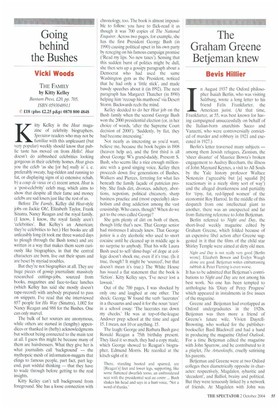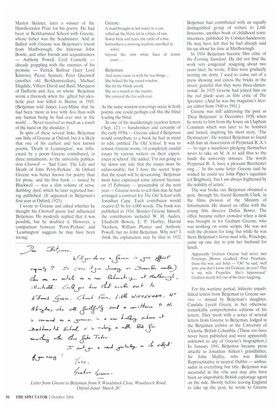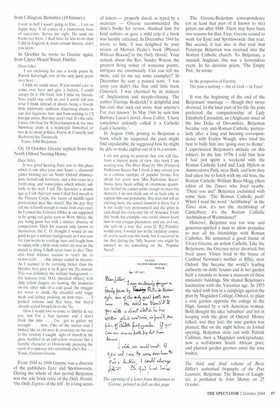The Graham Greene Betjeman knew
Bevis Hillier
In August 1937 the Oxford philosopher Isaiah Berlin, who was visiting Salzburg, wrote a long letter to his friend Felix Frankfurter, the American jurist. (At that time, Frankfurter, at 55, was best known for having campaigned unsuccessfully on behalf of the Italian-born anarchists Sacco and Vanzetti, who were controversially convicted of murder and robbery in 1921 and executed in 1927.)
Berlin's letter traversed many subjects — among them Jewish refugees, Zionism, the 'sheer disaster' of Maurice Bowra's broken engagement to Audrey Beecham, the illness of John Maynard Keynes, a visit to All Souls by the Yale history professor Wallace Notestein ('agreeable but [a] squalid [b] reactionary in a nicely slimy sort of way') and the alleged drunkenness and partiality for 'tipsy, fat, red-lipped women' of the economist Roy Harrod. In the middle of this despatch from one intellectual giant to another, there was an unexpected and far from flattering reference to John Betjeman.
Berlin referred to Night and Day, the short-lived weekly magazine edited by Graham Greene, which folded because of an expensive libel action after Greene suggested in it that the films of the child star Shirley Temple were aimed at dirty old men.
Night and Day is not really very good [Berlin wrote]. Elizabeth Bowen and Evelyn Waugh alone are good. Betjeman writes embarrassing rubbish & Peter Fleming is even worse.
It has to be admitted that Betjeman's contributions to Night and Day are not among his best work. No one has been tempted to anthologise his 'Diary of Percy Progress' which appeared in instalments in five issues of the magazine.
Greene and Betjeman had overlapped as Oxford undergraduates in the 1920s. Betjeman was then more a friend of Greene's future wife, Vivien DayrellBrowning, who worked for the publisherbookseller Basil Blackwell and had a hand in producing the magazine Oxford Outlook. For a time Betjeman edited the magazine with John Sparrow, and he contributed to it a playlet, The Artsenkrafts, cruelly satirising his parents.
Betjeman and Greene were at two Oxford colleges then diametrically opposite in character: respectively. Magdalen, sybaritic and 'decadent', and Balliol, brainy and political. But they were tenuously linked by a network of friends. At Magdalen with John was Martyn Skinner, later a winner of the Hawthornden Prize for his poetry. He had been at Berkhamsted School with Greene, whose father was the headmaster. And at Balliol with Greene was Betjeman's friend from Marlborough, the historian John Bowie, and other friends and acquaintances — Anthony Powell, Cyril Connolly — already grappling with the enemies of his promise — Patrick Balfour (later Lord Kinross), Pierce Synnott, Peter Quennell (another old Berkhamstedian), Michael Dugdale, Villiers David and Basil, Marquess of Dufferin and Ava, on whom Betjeman wrote a threnody when the gifted but alcoholic peer was killed in Burma in 1945. (Betjeman told James Lees-Milne that he had been 'more in love with Ava than with any human being he had ever met in the world ... Never received so much as a touch of the hand on the shoulder.)
In spite of these several links, Betjeman saw little of Greene at Oxford, but it is likely that one of his earliest and best known poems, 'Death in Leamington', was influenced by a poem Greene contributed, in three instalments, to the university publication Cherwell — 'Sad Cure: The Life and Death of John Perry-Perkins'. At Oxford Greene was better known for poetry than for prose, and his first book — issued by Blackwell — was a slim volume of verse, Babbling April, which he later regretted having published. (It appeared in Betjeman's first year at Oxford, 1925).
I wrote to Greene and asked whether he thought his Chetwell poem had influenced Betjeman. He modestly replied that it was possible, but he doubted it. However, a comparison between 'Perry-Perkins' and 'Leamington' suggests he may have been wrong:
Greene:
A maid brought in hot water in a can, roiled up the blind, let in a blaze of sun, flower beds and trees, the rattle of a hoe. Somewhere a mowing machine unrolled its
whirr, beyond the trim white lines of tennis court . . .
Betjeman:
And nurse came in with the tea-things ...
She bolted the big round window, She let the blinds unroll, She set a match to the mantle, She covered the fire with coal.
As the same window-coverings occur in both poems, one could perhaps call this the blind leading the blind.
In one of his maddeningly yearless letters (`Sep. 12') — handwritten and certainly of the early 1930s — Greene asked if Betjeman would contribute to a book he had in mind to edit, entitled The Old School. It was to consist, Greene wrote, 'of completely candid essays by various writers on their experiences at school'. He added, 'I'm not going to lay down any rule that the essays must be unfavourable, but I have the secret hope that the result will be devastating.' Betjeman must have expressed some interest because on 15 February — presumably of the next year — Greene wrote to tell him that he had arranged a contract for The Old School with Jonathan Cape. Each contributor would receive £5 8s for 4,000 words. The book was published in 1934. Besides Greene himself, the contributors included W. H. Auden, Elizabeth Bowen, L. P. Hartley, Harold Nicolson, William Plomer and Anthony Powell, but no John Betjeman. Why not? I think the explanation may be that in 1932 Betjeman had contributed with an equally distinguished group of writers to Little Innocents, another book of childhood reminiscences, published by Cobden-Sanderson. He may have felt that he had already said his say about his time at Marlborough.
In 1934 Betjeman became film critic of the Evening Standard. He did not find the work very congenial: resigning about two years later, he wrote, 'Films were gradually turning me dotty. I used to come out of a press showing and caress the bricks in the street, grateful that they were three-dimensional.' In 1935 Greene had joined him on the red plush seats as film critic of The Spectator. (And he was the magazine's literary editor from 1940 to 1941.)
Greene was still addressing the poet as 'Dear Betjeman' in December 1938, when he wrote to him from the house on Clapham Common which was later to be bombed and looted, inspiring his short story, 'The Destructors'. He wanted Betjeman to found with him an Association of Perpetual B. A's — 'to sign a manifesto pledging themselves never to take an M. A. to add thus to the funds the university misuses. The words Perpetual B. A. have a pleasant Barchester ring In the same letter Greene said he wished he could see John Piper's aquatints (of Brighton), 'but I am always frightened by the nobility of artists'.
The war broke out. Betjeman obtained a post, through his friend Kenneth Clark, in the films division of the Ministry of Information. He shared an office with the young film director Dallas Bower. The office became rather crowded when a desk was brought in for Graham Greene, who was working on some scripts. He was not with the division for long, but while he was there Betjeman's horse-mad wife, Penelope, came up one day to join her husband for lunch.
Apparently Graham Greene had never met Penelope [Bower recalled]. Poor Penelope, there she was, and John — 'Oh!' he said, 'well now, you don't know old Graham, do you? This is my wife Propellor. She's hipposexual: Graham nearly fell out of his chair laughing.
For the wartime period, hitherto unpublished letters from Betjeman to Greene survive — missed by Betjeman's daughter, Candida Lycett Green, in her otherwise remarkably comprehensive editions of his letters. They mesh with a series of several letters from Greene to Betjeman, lodged in the Betjeman archive at the University of Victoria. British Columbia, (These too have never been published and were apparently unknown to any of Greene's biographers.) In January 1941 Betjeman became press attaché to Jonathan Aitken's grandfather, Sir John Maffey, who was British Representative in neutral Dublin — ambassador in everything but title. Betjeman was successful in the role and may also have been an improbable British espionage agent on the side. Shortly before leaving England to take up the post, he wrote to Greene from Uffington, Berkshire (19 January):
I wish to hell I wasn't going to Eire I am so happy here. It all comes of a momentary bout of careerism. Serves me right. Do send me books out there. I shall have far less to do than I did in England & must remain literary, don't you know.
In October he wrote to Greene again, from Upper Mount Street, Dublin:
Dear feller.
I am enclosing for you a lovely poem by Patrick Kavanagh, one of the only good poets over here ...
I wish we could meet. If you would care to come over here and give a lecture. I could always fix it. Oh God, how I miss my friends. You could stay with us and I could tell you what I think instead of always being a bloody little diplomatic sunbeam dispensing charm in our dim legations here and bum-sucking to [?] foreign artists. But they aren't bad. It's the exile I miss. Oh God for Wolverhampton & the nice Mowbray altars & a municipal flowerbed or two & no more politics, Pearse & Connelly and Redmond the Taoiseach.
Yours, John Betjeman
On 18 October Greene replied from the North Oxford Nursing Home:
Dear John.
It was good hearing from you in this place which is one after your own heart — diamond panes looking out on North Oxford chimneypots, fumed oak furniture, and a few roses in a tooth-mug, and water-pipes which whistle sullenly in the wall. I left The Spectator a month ago as I felt that very soon I shall find myself in the Pioneer Corps, the haunt of middle-aged professional men like myself. But the pay they tell me is hardly enough to make both ends meet. So I joined the Colonial Office & am supposed to be going out quite soon to West Africa, the pay being good but with a sinister absence of competition. Then for reasons only known to themselves, the C. 0. thought it would do me good to get a military background, so I was sent for four weeks to a college here and taught how to salute with a little stick under my arm on the march (a thing I shall never have to do.) They also tried without success to teach me to motor-cycle . . . this always ended in disaster. As I seemed to he surviving better than the bicycles, they gave it up & gave me 'flu instead. This was definitely the military background — the hideous little M.O. [medical officer] with dirty yellow fingers, no heating, the lavatories on the other side of a cold quad, the struggle for water to drink, the dreadful cold soggy steak and kidney pudding on iron trays . . . I packed suitcase and fled here, but they'd already added bronchitis to the 'flu.
How I would love to come to Dublin & see you. but I'm a bad lecturer and I don't think this time . . . I've got to gather my strength . . . now. One of the nurses said I looked like an old man & yesterday on the way to the lavatory 1 caught sight of myself in the glass, huddled in an old yellow overcoat like a humble character in Dostoievsky pursuing the scent of a samovar into somebody else's flat .. . Yours, Graham Greene
From 1944 to 1948 Greene was a director of the publishers Eyre and Spottiswoode. During the whole of that period Betjeman was the sole book critic of the Daily Herald, `the Daily Express of the left'. In a long series of letters — properly dated, as typed by a secretary — Greene recommended the firm's books for review, thanked him for kind notices, or gave a mild yelp if a book was harshly criticised. In December 1944 he wrote to him. 'I was delighted by your review of Mervyn Peake's book [Rhymes Without Reason] in the Daily Herald. Your remark about the Rev. Sandys Wason, the greatest living writer of nonsense poetry, intrigues me enormously. Can you tell me more, and let me see some examples?' In December he sent a pained note: 'I was sorry you didn't like that odd little book Gimcrack. I was charmed by its mixture of Anglicanism and steeple-chasing. The author [George Roderick] is delightful and has ears that stick out more than anyone's I've ever known.' In May 1946 he sent him Barbara Lucas's novel, Anna Collett. `I have sometimes unkindly called it a Catholic Lady Chatterley.' In August 1946, posting to Betjeman a book which he suspected the poet might find unpalatable, he suggested how he might be able to make capital out of it in a review.
I am not going to pretend that you will like, from a literary point of view, this book I am sending you, The River Road by Mrs [Frances] Parkinson Keyes. but I think it may amuse you as a curious example of popular favour. For about ten years now Mrs Parkinson Keyes' books have been selling in enormous quantities. In fact we cannot print enough to meet the demand. I do not think any of us feels able to explain this odd popularity. She does not tell an exciting story, the sexual element is there but it is not really very pronounced and she gives in vast detail the every-day life of America. From this book, for example. one could almost learn how to run a sugar plantation, and yet, as I say, she sells in a way that even [J. B.] Priestley would envy. I would not in the ordinary course of events send you this book, but it occurred to me that during the 'Silly Season' you might be amused to do something on the 'Popular Novel'.
The Greene-Betjeman correspondence (or at least that part of it known to me) peters out after 1948. There may have been two reasons for that. First. Greene ceased to work for Eyre and Spottiswoode that year. But second, it was also in that year that Penelope Betjeman was received into the Roman Catholic church. To Betjeman, a staunch Anglican, this was a horrendous event. In his desolate poem, 'The Empty Pew', he wrote:
In the perspective of Eternity The pain is nothing — but ah God—in Time!
It was the beginning of the end of the Betjemans' marriage — though they never divorced. In the later part of his life the poet preferred the companionship of Lady Elizabeth Cavendish, an (Anglican) sister of the late Duke of Devonshire. Betjeman became very anti-Roman Catholic, particularly after a long and bruising correspondence with Evelyn Waugh, who tried his best to bully him into 'going over to Rome'. I experienced Betjeman's attitude on this subject. In the late 1970s I told him how I had just spent a weekend with the Roman Catholic Lord and Lady Hylton at Ammerdown Park, near Bath, and how they had taken me to lunch with my old boss, the Roman Catholic William Rees-Mogg (then editor of the Times) who lived nearby. `There you are!' Betjeman exclaimed with some heat. 'The Roman Catholic push! When I read the word "Archbishop" in the Times now, it's not the Archbishop of Canterbury; it's the Roman Catholic Archbishop of Westminster!' However, Betjeman was too wise and generous-spirited a man to allow prejudice to mar all his friendships with Roman Catholics. He remained a good friend of Vivien Greene, an ardent Catholic. Like the Betjemans, the Greenes never divorced, but lived apart. Vivien lived in the house of Cardinal Newman's mother at Iffley, near Oxford. She became the world's leading authority on dolls' houses and in her garden built a rotunda to house a museum of these miniature buildings. She shared Betjeman's fascination with the Victorian age. In 1953 she sided with him in a campaign against the plan by Magdalen College, Oxford, to plant a rose garden opposite the college in the High, funded by a rich American woman. Both thought the idea 'suburban' and not in keeping with the glory of Oxford. Money talked, and they lost: the rose garden was planted. But on the night before its formal opening, Betjeman stole out with Patrick Cullinan, then a Magdalen undergraduate, now a well-known South African poet, and planted garden gnomes amid the rose bushes.
The third and final volume of Bevis Hillier's authorised biography of the Poet Laureate, Betjeman: The Bonus of Laughter, is published by John Mun-ay on 25 October.




















































































 Previous page
Previous page